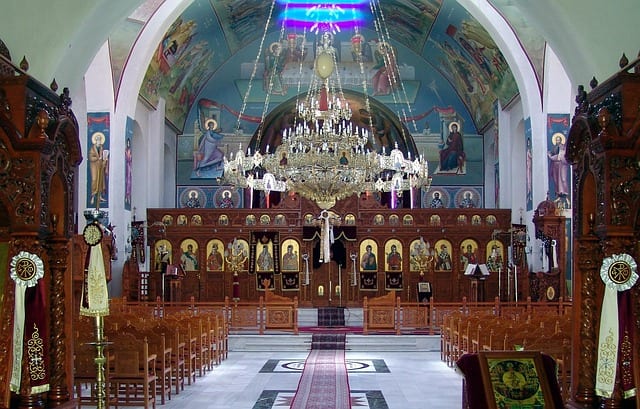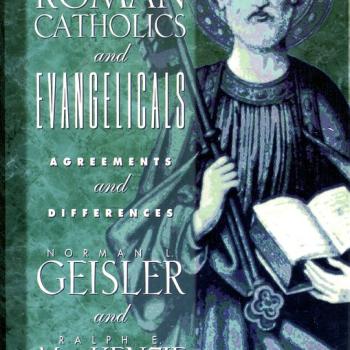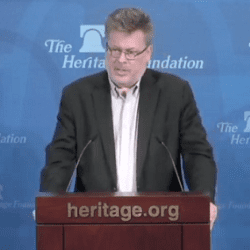
This is an exchange with four people: from my old Internet discussion group (3-20-99). Words of the first person (Catholic) will be in brown, two Orthodox participants’ words in blue and green, and a Protestant in purple.
*****
I have heard of many Orthodox Christians who are former Catholic Christians but I have yet to hear of any Catholic Christians who are former Orthodox Christians. I would love to hear your views on this. By the way, I am not trying to start a list war. I am just genuinely curious.
Interesting observation and question. My speculations (and I reiterate that they are no more than that) would be the following:
1) There are many more Catholics than Orthodox (especially in the US), so you would expect to find more movement in the Catholic —-> Orthodox direction, by sheer force of numbers.
2) The false equation of Catholicism with theological liberalism, whereas Orthodoxy is perceived as pure Christian traditionalism and a refuge from modernism (I have argued the contrary – in essence – in my paper: Is Orthodoxy Immune from Modernism and Dissent?). For example, I myself ruled out Orthodoxy as an option early on because of its acceptance of divorce and contraception: precisely some of the areas I had come to disavow as an evangelical, and of the essence of a theologically liberal outlook, as I understood it, then and now.
3) Liturgical abuse in Catholic circles is quite real, troubling, and widespread, of course, and that scandalously leads many conscientious, pious folks to Orthodoxy, which has done a commendable job of preserving reverence and piety and beauty in its liturgy (my response would be that such considerations are too limited to warrant abandoning a faith — truth or falsity not being determined by abuses).
4) Orthodoxy suffers from much incipient anti-Catholicism, whereas Catholicism has no similar strain of anti-Orthodoxy. We are officially ecumenical. The Orthodox are divided on this issue (as is so often the case). Therefore, we would expect to see Catholic —> Orthodox movement, because we regard Orthodoxy as a “sister Church” and accept her apostolicity and sacraments. In other words, it is more conceivable to move from one apostolic Church to another than it is to move from the Church to the apostate, heretical “church” with neither valid sacraments nor apostolicity;
5) I would contend that many Orthodox hold a purely “fideistic” notion of their faith. As such, they are less open to reason and rational analysis in matters of faith. Assuming the truth of the foregoing, it would stand to reason that Orthodox would not as readily convert, since they have less reason to. ) One Orthodox on our list, for example, strongly implied in dialogue with me that no one can really comprehend Orthodoxy short of espousing it. I stated that if there was no reason to join Orthodoxy, then I could not join it, since I value God-given rationality too much. He has as his motto “I believe because it is absurd” — case in point. Converts to Catholicism, on the other hand, often have lengthy theological, moral, historical, or experiential reasons as to why they converted (indeed, all four variables were involved in my own conversion);
6) I would highly suspect that such converts (like many many converts to Protestantism from Catholicism) were also usually weak in their Catholic faith, particularly in those areas where the Orthodox sharply disagree: development of doctrine, the papacy, some Marian doctrines, contraception, divorce, philosophical apologetics, etc. Not knowing their faith, they are easy prey for Orthodox apologists who stress the horrible liberalism in the Catholic Church, which they take to be its essence, when in fact it is a corruption (albeit tragically widespread at the moment);
7) Orthodoxy is much less prone to bashing from the overall society, since it is basically insulated (by choice) from the larger society. With less lies told about it, and less prejudice (from sheer unfamiliarity), it is less likely to be seen as “undesirable” by converts to it. Catholicism, on the other hand, is subjected to a constant barrage of disinformation and propaganda. That makes it much harder to convert to it.
I know of at least one published convert from Orthodoxy to Catholicism: James Likoudis. His story is recounted in Spiritual Journeys (edited Robert Baram, Boston: St. Paul Books & Media, 1988). I’m sure there are others published. This is the only one I recall offhand.
But why exclude the ones who started out Catholic? Since Orthodox make a big deal about the Catholic —> Orthodox journey, why should we minimize or dismiss those who made that journey and then felt compelled to return to Catholicism? Their odysseys are just as valid and worthy of consideration. I know of two such people personally.
There are also many Catholic converts who seriously (with a great deal of comparative study) considered Orthodoxy and Catholicism, and decided upon Catholicism. I know four such people just among my circle of friends, including Steve Ray, author of Crossing the Tiber, and Al Kresta, whose story appeared in Surprised by Truth after mine.
When all these factors are taken into consideration, I don’t think the observable trends are especially troubling or a negative reflection of the Catholic claim to preeminence over against the Orthodox claim. That’s just my opinion, and I acknowledge that this subject matter is highly subjective, but that’s the explanation of the situation, as far as my own analysis, for what it’s worth.
I didn’t reduce its importance in the slightest, I was simply acknowledging that abuses occur. But it is simple enough for a Catholic to attend a Mass where they do not occur. It is not a reason to reject Catholicism and go to Orthodoxy simply because of these abuses. That was my argument.
[regarding my point #4 above] This is simply not true. You notice anti-catholicism because you are Catholic, and therefore sensitive to it.
You deny that Orthodoxy has a pronounced anti-Catholic strain???!!!
Case in point: Frank Schaeffer’s Christian Activist has produced yet another ranting and raving diatribe against Catholicism, replete with half-truths, flat-out lies, slander, historical revisionism, glaring omissions, one-sidedness, countless barbs and insults, gratuitous and unnecessary slams, etc. It is a pathetic rag, and Schaeffer (for whom I have a great deal of respect in other ways) ought to know better. But this merely reinforces my point that Orthodoxy (like fundamentalism and much of Calvinism) almost has to be anti-Catholic, by its very nature.
In the latest issue (vol. 13: Winter/Spring 1999), they go after the history of the papacy, papal infallibility, St. Augustine, and Scott Hahn’s understanding of Orthodoxy before he converted. Isn’t it possible for these folks to present Orthodoxy proactively without lying about us? It is so childish, and embarrassing to observe. Then in the cover story, of a conversion, by Professor William Bush (“The Mystery of the Church: The Pilgrimage of an Orthodox Convert”), we see such silly and fatuous remarks as the following:
[M]edical tribunals must verify miracles, thus betraying the Roman Church’s overweening desire to be respected of men by submitting the works of God to the standards of western technology. (p. 11)
I guess, then, that Jesus was compromising with “western technology” when he allowed Doubting Thomas to feel the wound in His side. In case anyone didn’t notice, this is empirical (scientific) proof. He went on to say that those who didn’t see, yet believed were more blessed (John 20:24-29), but the point was that empirical evidence was okay. But — our Orthodox friend would have us believe — even so, just forget all about “proof” and reason and “just believe.”
The Resurrection itself is also something which is historically verifiable, and in an eyewitness sense. All through the Bible God manifested Himself miraculously and physically in order to bolster the faith of His people. But it is wrong to attest to miracles, according to our critic. He shows himself very ignorant of a constant biblical theme. And is it true that, for example, Orthodox weeping icons are never allowed to be tested by scientists? Is there a refusal to ever do that? I would like to know.
Bush goes on to wax eloquent about the glory days of the Byzantine Empire, from 330 to 800 and beyond, comparing it to Rome being overrun by barbarians, the “illiterate” Charlemagne vs. the “highly literate Byzantine counterpart,” etc. (p. 11). It’s the same old stupid and silly prejudice against the West . . . Of course he never once mentions stubborn facts such as that there were at least 42 heretical patriarchs of the three major Sees of the East during that same period, while Rome remained orthodox at all times (see that documented in my paper: Roman See as Historic Standard-Bearer of Orthodoxy). That wouldn’t fit in with the myth he wishes to put forth, so he conveniently omits it.
Then — as always — he has to bring up the sack of Constantinople in 1204 (p. 13) and go on and on about how wicked the “western” Crusaders were. I don’t mind that. It was an unspeakably abominable incident. What I do mind is the one-sided presentation (similar to many Protestant treatments of the 16th century), as if the Easterners were squeaky-clean throughout this period, and the westerners bloodthirsty barbarian murderers and rapists en masse. The truth (as usual) is much more complex. For some balance, and brief recountings of similar Eastern horrors and persecution, see my paper: Sack of Constantinople (1204) & Unknown Byzantine Atrocities.
One could find dozens of ridiculous examples of falsehoods and misrepresentation in this article. Some few selections:
[T]his experiment with Renaissance humanism . . . Rome’s own innate Protestant sectarianism has become more and more blatantly manifest in all she does. (p. 14)
[A]t . . . Trent, Vatican I, and Vatican II, Rome . . . thanks to her totalitarian organization, set aside ancient traditions touching upon all aspects of the Christian life. (p. 14)
Thanks to the rise of the papacy, the Roman Church has thus virtually lost all sense of the sacred character of Holy Tradition as understood by the Orthodox. The indispensable role of Holy Tradition in the mystery of the Church has thereby largely disappeared in the whole of western Christendom. (p. 14)
The Orthodox rightly suspect that all Rome really wants is to effect a political union such has been brought through all her schemes to join the ‘eastern rite’ churches to herself. (p. 14)
Catholicism has openly — and, as it were, with a vengeance — repeatedly confirmed her own latent Protestantism. (p. 15)
[I]incumbents of St. Peter’s throne have left the West with a church that would be unrecognizable to one of their predecessors of a thousand years ago. (p. 15)
On and on it goes. Note the sweeping, extremely judgmental language, with little concern for fairness or accuracy, let alone charity. But alas, my Orthodox friend sees no major problem of anti-Catholicism in Orthodoxy’s ranks.
I am Orthodox and am therefore more sensitive to anti-Orthodoxy. If there is less anti-Orthodoxy among Catholics than anti-Catholicism among the Orthodox it is because many Catholics are not even aware of Orthodoxy, while all Orthodox are aware of the RCC.
That doesn’t mean they have to be “against” it, yet so often they are.
The RCC has been “officially ecumenical,” as you say, since the 1960’s. Prior to that they were anything but.
It has been a development (and much more so in the last century). But it is a fallacy to think that it sprang out of nowhere in the 60s. See, for example: Ecumenical Gatherings at Assisi: A Defense: Ecumenism in St. Thomas Aquinas (Fr. Alfredo M. Morselli).
Quite the opposite. After centuries of bad blood it might take more than 30 years to totally reverse the hard feelings.
Is this only our problem, or that of human nature in general (including the Orthodox)?
Actually, most of the Catholics I know who have become Orthodox were extremely well educated in the faith.
I would like to “test that” myself. Would any of them be willing to dialogue? I shall see how well they knew their former faith. Certainly some did, but I would highly suspect that many didn’t. For example, I have rarely met any Orthodox who rightly understand the Catholic notion of development of doctrine. It is one thing to adopt the view, but quite another to at least understand what it is.
Trust me, the more the media learns about Orthodoxy the more they will hate us. We are much more at odds with western culture than is the RCC.
I agree. My point was the existing situation, not the potential or future one.
The experience is so direct that you can experience directly in the liturgical actions of Holy Church. Outside of Her, it’s the will of God– but it all goes back to Holy Church eventually. Now, when the faith (not of this world, and incomprehensible) is intertwined with that of this world (say, the Holy Spirit guiding a particular office by default) we get…nervous. Do you see the difference here?
I don’t even understand what you are saying (let alone judging whether I think it true or not). This has been our problem in the past. But you are living out your motto again, from where I sit . . . :-)
You may view this as an odd interpretation, but “render to Caesar the things that are Caesar’s, render to God what is his.
Are you saying that reason is one of the things of Caesar?
Well, Orthodoxy, brother, is not contrary to reason– it loves reason. But it certainly does not view a lack of reason as central.
So if a particular Orthodox view is unreasonable, that is okay? How far do you take this?
We like to keep reason about 12 steps below God.
The very fact that you feel the need to imply an opposition of reason against God (as if that were possible) is indicative of the problem. God is truth, and truth is not opposed to (right) reason. We can arrive at truths by means other than reason (e.g., experience, intuition, revelation, faith, etc.), but that is a different proposition from saying that reason is somehow “unclean” in and of itself. But your statement has little meaning. It’s like saying:
- “We like to keep chastity about 12 steps below God”; or
- “We like to keep helping the poor about 12 steps below God”; or
- “We like to keep soteriology [the theology of salvation] about 12 steps below God.”
There is a measure of truth to this. Obviously a thing isn’t fully known until one experiences it. But that’s not really what I was driving at. Like all philosophical (in this instance, epistemological) issues, there are many subtleties and nuances. My point was that one can’t fully rejoice in and espouse something he can’t understand. Secondly, that a viewpoint must present itself at least as not contrary to, or apathetic towards reason (plausibility is a further step), in order for any rational person to accept it.
If in fact Orthodoxy is incomprehensible to the outsider, and must be accepted with blind faith, then my original point stands, and this is indeed the perspective known as fideism. Personally, I cannot join such a faith (assuming for the sake of argument that Orthodoxy is to be characterized as such — I would suspect there are internal disagreements), as it would do violence to the reason I believe God gave me in the first place. I take a very dim view of any attempts to oppose reason and faith, rather than synthesizing them into a harmonious whole.
She cited my words:
Converts to Catholicism, On the other hand, often have lengthy theological, moral, historical, or experiential reasons as to why they converted.
I’m sure converts to Catholicism have those ‘reasons’, but are you suggesting converts to Orthodoxy don’t?
Not in every case; of course not. I was speaking very generally (by the nature of the subject). I would say, however, that Orthodoxy places reason lower in the scheme of things than I think it should. This is indicated — in my humble opinion — by the constant Orthodox disdain of Scholasticism and what it calls “western rationalism,” etc. It views rational inquiry into the mysteries of faith and intricacies of theology as somehow an unseemly, improper enterprise (yet, paradoxically, it does much the same in certain selected areas such as the filioque controversy).
Catholics, on the other hand, utilize reason as far as it can take us, while fully aware at all times that we can never fully plumb the depths of the Christian mysteries. As usual, I think a lot of the Orthodox objection to our “undue speculation” is based on misunderstanding as to its nature, scope, and purpose, from a Catholic perspective.
It’s purpose being?
To understand Christian theology, doctrine, spirituality, and God better, in order to more fully enter into it, live it, and to become closer to God, enter into personal relationship with Him, to serve Him, and to become more holy (and — if needs be — to defend the Church, so as to bolster the faith of others as well as one’s own). One can’t fail to be impressed by the number of times the Bible talks about “wisdom” or “knowledge” — or the opposite notions of “folly” and “fools” (look through Psalms and Proverbs, or check out any concordance). This is a given in the biblical worldview — it is assumed throughout (though in a very different sense from pagan Greek philosophy).
The biblical / Hebrew notion of “wisdom” meant the pursuit and/or possession of more knowledge of God and His precepts, for the purpose of living for Him more wholeheartedly; in other words, it is always a “practical wisdom,” never to be understood apart from concrete spiritual reality, as opposed to being considered merely abstractly as its own end (i.e., simply as syllogisms or logical analysis, or Enlightenment-type agnostic-oriented so-called “rationalism”).
That’s why the silly and tired perpetual Orthodox slander against St. Thomas Aquinas and the Scholastics (as exemplars of a “reasonable faith”) is an outrageous bum rap, because they completely understood this (esp. St. Thomas himself). Martin Luther did the same thing (as I have previously documented on this list), so I suppose it shouldn’t surprise us. Non-Catholics so often commit the same fallacies and “tactics” against the Catholic Church independently of each other (and sometimes not so “independently”). But I digress . . .
It is only the deliberate attempt to denigrate the reasoning process, or the intellect, or mental effort, or “philosophy,” or logic, which undermines what is clearly a biblical viewpoint and creates a false and unbiblical dichotomy between reason and faith. I could go on and on about this, but I trust that this short answer will suffice for now.
Luke 10:27 (NRSV) You shall love the Lord your God with all your heart, and with all your soul, and with all your strength, and with all your mind.
***
See much related material on my Eastern Orthodoxy web page.
***













